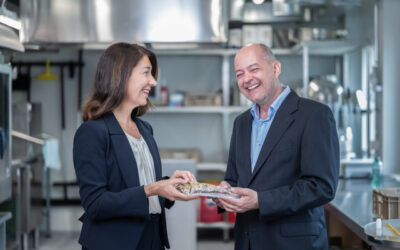HES-SO’s Sergio Schmid on projects, partnerships and pilot plants

We recently welcomed HES-SO – the largest specialized university in Switzerland – into the Valley community. So we thought it was time to sit down with Sergio Schmid, Head of the Institute of Life Technologies at HES-SO Valais, to chat about their contribution to the food ecosystem and explore how other Valley partners can connect into their work.
Can you tell us a bit more about the School of Engineering and the Institute of Life Technologies at HES-SO?
Certainly. HES-SO’s School of Engineering is a vibrant and welcoming community of students, professors and researchers. Every year, about 470 students follow our Bachelor’s and Master’s degree programmes. We also work with many PhD students in collaboration with partner universities in Switzerland and around the world.
Which topics do you and colleagues focus on?
Food and sustainability are key topics for us. Our Sustainable Food Systems research group, for example, covers the production and development of food products. They take an interdisciplinary approach, exploring consumer needs, expectations and preferences and considering how food systems need to change to mitigate climate change.
The topics we tackle can vary greatly. Our teams have recently focused on developing new processing approaches that help plant-based proteins reach price parity with animal-based proteins. Other colleagues have been exploring the potential of new bioplastics and how waste can be valorised through food technology and biotechnology.
How do you collaborate with partners and companies?
We actually develop around 200 projects a year, and most of these are joint projects with industry partners. We pride ourselves on finding ways to transform cutting-edge science and technology into solutions that can directly benefit the partners we work alongside.
We’re also fortunate to have a pilot plant. This means that we can initially carry out research on a pilot scale that can then be easily implemented on an industrial scale. This is often particularly valuable to smaller partners who aren’t yet able to invest in their own facilities and equipment.
We like to actively anticipate what support industry partners might need and work alongside them to develop new processes that enable them to innovate. But we also encourage companies to reach out to us about their specific challenges and would welcome the opportunity to collaborate with innovators who might be looking for a research partner.
How does HES-SO contribute to developing the food innovation ecosystem?
As a University of Applied Sciences, we ensure that the knowledge gained through our extensive research collaborations flows back into our courses. This means that our students are aware of the latest trends and how companies are responding to them – and are prepared to tackle real-life challenges in their careers after graduation.
At the same time, we encourage all our students to apply their knowledge and learn by doing throughout their studies. We see this as one of our key contributions to shaping the innovation ecosystem: we grow the talent that will shape the future of food.
Never miss a Swiss food innovation morsel.
Latest News
Yumame Foods and Le Patron partner for a delicious, plant-based future of food
Valley partner Yumame Foods and the...
What the food industry can learn from GDI’s Major Shifts model
The future is coming faster than many...
Meet the finalists of the Igeho Rising Star Award for 2025
Many startups applied. 15 made it to...
Nestlé and IBM leverage AI and deep tech to unlock new packaging innovations
Valley partner, Nestlé R&D has...




